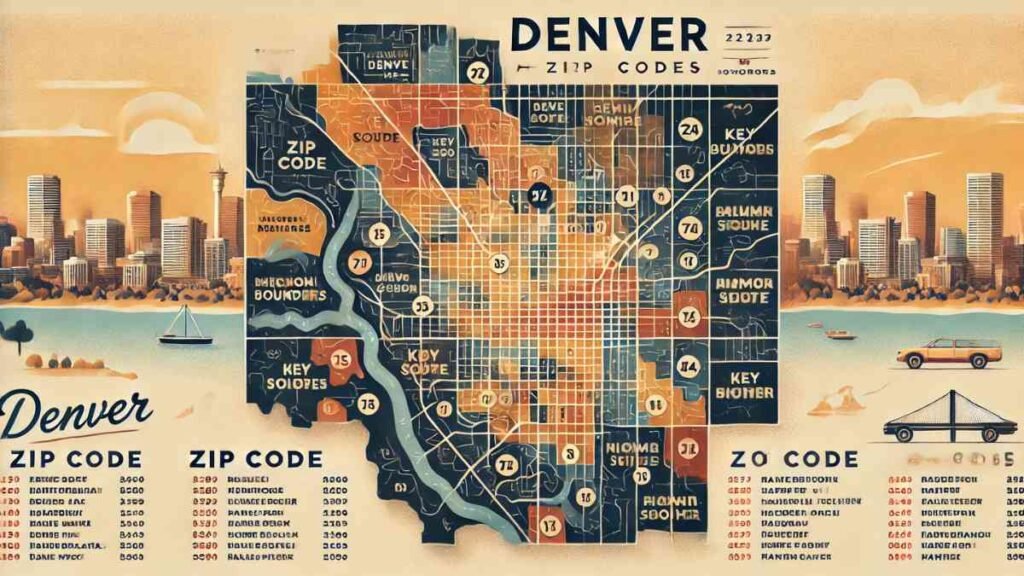Denver Zip Code system is an integral part of the city’s structure, organizing neighborhoods, districts, and various locales within the bustling Mile-High City. Whether you’re moving to Denver, conducting business, or exploring the city’s rich history, understanding the zip code layout can make navigating the city more convenient. Each Denver zip code tells a story about the community it encompasses, offering unique insights into the city’s diverse population, cultural landmarks, and residential areas. In this guide, we will delve deep into the importance of Denver’s zip code system and how it shapes daily life.
Understanding the Denver Zip Code System
The Denver Zip Code system is vital for organizing postal services, delineating neighborhoods, and even affecting real estate prices. Zip codes in Denver range from 80201 to 80299, covering distinct areas such as downtown Denver, suburban neighborhoods, and growing business hubs. The division of Denver into different zip code areas not only makes mailing efficient but also helps in identifying demographic, economic, and geographical differences within the city.
Key Zip Codes of Denver
80202: Downtown Denver
The 80202 zip code covers the heart of Denver’s downtown area. It’s home to major financial institutions, tourist attractions such as Union Station and Coors Field, and numerous restaurants, shops, and entertainment venues.
80203: Capitol Hill and Civic Center
The Capitol Hill neighborhood, famous for its historic mansions and vibrant culture, is situated within the 80203 zip code. This area also includes Civic Center Park, which hosts various festivals and cultural events throughout the year.
80209: Cherry Creek
The affluent Cherry Creek neighborhood falls under the 80209 zip code. Known for its upscale shopping district, fine dining, and luxury living, Cherry Creek is a popular destination for Denver’s elite.
80211: Highlands and LoHi
The 80211 zip code covers the trendy Highlands and Lower Highlands (LoHi) neighborhoods. These areas are known for their vibrant nightlife, modern eateries, and scenic views of downtown Denver from across the Platte River.
The Role of Zip Codes in Denver Real Estate
Denver’s zip code system plays a crucial role in the local real estate market. Property values, rental rates, and even school quality can vary significantly between different zip codes. Areas like 80209 (Cherry Creek) and 80206 (Congress Park) tend to have higher property values, whereas more affordable housing can be found in zip codes like 80219 (Harvey Park) and 80224 (Virginia Vale).
How to Use Denver Zip Codes for Efficient Navigation
For newcomers and tourists, Denver’s zip code system can be a useful tool for navigating the city. By understanding which zip codes correspond to particular areas, you can plan your visits, choose accommodations, and discover local attractions with ease. Most of Denver’s major neighborhoods are easily identifiable by their zip codes, allowing for efficient navigation.
Denver Zip Code Demographics and Diversity
Each Denver zip code has a unique demographic profile, reflecting the city’s diversity. The population density, cultural makeup, and age distribution can vary from one zip code to another. For instance, the 80220 zip code, covering East Colfax, is known for its ethnic diversity, while 80238, which encompasses Central Park, is a rapidly growing family-friendly area.
Business and Economic Impact of Denver Zip Codes
Many businesses in Denver strategically choose their locations based on the city’s zip code divisions. Areas like 80202 and 80216, which are close to downtown, attract large corporations, tech startups, and other enterprises. In contrast, residential zip codes such as 80210 (University) and 80231 (Hampden) are ideal for local businesses catering to families and students.
Denver Zip Code Changes and Future Developments
As Denver continues to expand, the city’s zip code system may evolve to accommodate new neighborhoods and developments. In recent years, there has been a growing demand for housing in suburban areas, leading to the establishment of new zip codes in and around Denver. This expansion reflects the city’s rapid growth and its increasing appeal to young professionals and families.
Conclusion
The Denver Zip Code system is more than just a tool for mail delivery—it’s a key factor in defining the city’s neighborhoods, real estate market, and business landscape. By understanding how Denver’s zip codes are organized, you can gain valuable insights into the city’s culture, demographics, and economic opportunities. Whether you’re a long-time resident or a first-time visitor, Denver’s zip codes are an essential part of navigating and experiencing this vibrant city.
For More Visit, MirrorMagazine.co.uk


